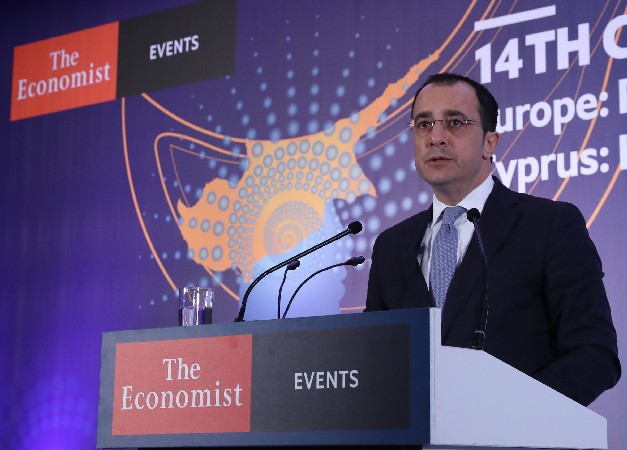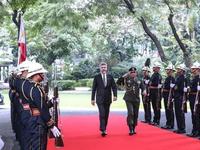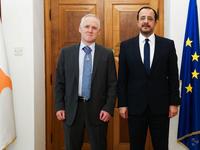Press Releases

02-11-2018 10:04
Address by the Minister of Foreign Affairs, Mr Nikos Christodoulides, at the 14th Cyprus Summit of The Economist
“Energy security and regional conflicts: east Mediterranean in search of stability”
It is with great pleasure that I participate today in the Economistʼs Cyprus Summit. The interaction and exchange between such esteemed participants, is both timely and appropriate.
My effort during todayʼs discussion is three-fold:
- First, to make the case for the Eastern Mediterranean, far beyond its undeniable challenges, and more about its remarkable promises and prospects, which have the potential, if realized, to have a ripple effect that extends beyond the regionʼs geographical boundaries.
- Second, to present how Cyprus has embarked on a journey of transforming its geographical position into an asset, as a reliable, stable vessel for promoting its vision to make the region a frontier of stability through multilateral cooperation.
- And third, to argue that the key in what might at first appear as an elusive search for stability in the region lies in building a strong web of regional cooperation.
Dear friends,
Despite the fact that our corner of the world, more often than not makes headlines for the deep challenges that no one can deny it faces, I choose to focus my presentation on the regionʼs promises. That is not so much because I am by nature an optimist, but because I strongly believe that the international community needs to seize the moment and the regionʼs emerging opportunities as a medium to advance prosperity and stability.
Let me start by outlining why I believe that the present juncture is different and merits action. A crucial parameter to this proposition is found in the sea that surrounds the countries of the region, and more specifically, the recent discoveries of hydrocarbon reserves in the Eastern Mediterranean sea. At a time when demand for natural gas is expected to rise and inter-regional supply is expanding significantly all over the world, but also at a time when Europe has placed energy security and diversification of routes and sources at the frontline of its priorities, the recent discoveries certainly merit special attention.
Numbers often speak louder, and clearer than words, so let us consider the following. According to assessments by the United States Geological Survey, the total quantities of natural gas in the Levantine Basin and the Nile Cone in the Eastern Mediterranean are estimated to be about 9350 billion cubic meters. In the last decade the discoveries made in the Exclusive Economic Zones of Cyprus, Egypt and Israel are approximately 2500 billion cubic meters. For comparison purposes, let me just mention that the natural gas reserves of Norway are estimated at 1856 bcm, while the annual needs of the EU in natural gas are currently about 540 bcm.
What do these numbers tell us? For one they reveal that the Eastern Mediterranean region holds huge quantities of natural gas and oil. It is also clear that the discoveries of hydrocarbon reserves can contribute towards the transformation of the Eastern Mediterranean into an area of sustainable economic development. Moreover, the discoveries have the potential of providing countries of the region with sufficient and stable energy supplies in natural gas at affordable price, while at the same time they can contribute to Europeʼs energy security.
Let me now pass to the second component of my presentation, which is how Cyprus has embarked in the last five years on a journey of transforming its unique geographical position into an asset and projecting its vision for the Eastern Mediterranean. In order to fulfil this vision Cyprus has had to utilize two important parameters:
Firstly, its historically close and friendly relations with all its neighbours - with the one sole exception that we hope in the near future will decide not to be the exception any more - coupled with the fact that our partners in the region see Cyprus as a trustworthy, moderate voice between them and Europe.
And secondly, its reliance, full observance and active promotion of the only credible and viable framework of regional and international cooperation, namely, international law.
With these two elements as its solid basis, Cyprus decisively directed its efforts towards building a web of cooperation in the region. Energy became the clearest starting point for our efforts. Cyprus proceeded with the conclusion of three agreements – with Egypt, Israel and Lebanon – delimiting our respective exclusive economic zones, based on the median line principle, fully in line with the 1982 United Nations Convention on the Law of the Sea. It is worth recalling that the 1982 Convention has secured global recognition, and is considered as part of customary international law, which means that it is binding on all states, irrespectively of whether they have acceded to it or not.
The delimitation of our seas has created a new regional dynamic and a new diplomatic framework. First, it has created greater transparency based on international law. Second, it has created a new economic border structure. And third, and perhaps most importantly, it set up a new framework for dialogue around a concrete shared goal.
The delimitation agreement with three of our neighbours was a first, crucial step taken, which created the necessary legal and economic security that attracted major oil and gas companies to invest and do business in the Eastern Mediterranean. Giant oil and gas companies have signed Production Sharing Contracts with Cyprus, they are present in our exclusive economic zone and they carry out exploratory drillings and development activities. These developments constitute the clearest message and vote of confidence both to the prospects of new hydrocarbon discoveries but also a vote of confidence to Cyprus and countries of the region.
Needless to say that any challenge to the delimitation agreements Cyprus has concluded is a challenge to all countries in the region, but also to rule-based international order. Cyprus is a defender of rule-based international order, of international law, including the law of the sea, and in this spirit we are ready to negotiate delimitation agreements with all countries in the region, without any exception, always in accordance with international law, including UNCLOS.
Beyond the delimitation agreements we have concluded, there have been many other steps during the course of the last years. Let me refer to the very recent signing of the Intergovernmental Agreement with Egypt, the first of its kind in our region, concerning the construction of an underwater pipeline to export natural gas to Egypt.
At the same time, Cyprus has worked methodically within the EU to make the case for the energy potential of the region and the significant impact it can have in Europe. That is why the EU has stepped up and is supporting Cyprusʼs efforts, both by repeatedly stressing its support to the exercise of our sovereign rights in our exclusive economic zone but also, beyond political rhetoric, by participating in the EastMed pipeline project, which the European Commission adopted as a Project of Common Interest.
Dear friends,
The re-drawing of the energy map in the Eastern Mediterranean, coupled with our conviction that the regionʼs natural resources can be used as a tool for cooperation and a platform for synergies, triggered the development of multilateral cooperation in the region that has gradually become a driver of change. This is the third component of my presentation.
The trilateral cooperation partnerships that Cyprus established together with Greece and neighboring countries are a prime example of this multilateral cooperation, at a time when multilateralism in international relations is under attack. They constitute a fitting example of what can be achieved when countries with shared concerns and common interests join powers, instead of isolating themselves.
The central tenets of these cooperation mechanisms are that they are inclusive in nature and are not directed against any third country. On the contrary, they are an instrument for promoting cooperation in the region and beyond, and are open to all countries who share the vision, and most importantly, respect international law.
We believe that the trilateral mechanisms are a first promising step towards a regional, institutionalized cooperation mechanism. In fact, Cyprus has consistently maintained that hydrocarbons in the Eastern Mediterranean can become what the coal and steel was for the European Community, in a new regional context; we have seen this in practice, with trilateral cooperation mechanisms starting from the field of energy but constantly expanding in new fields.
Moreover, the added value of this cooperation has drawn the attention of other countries and announcements towards this direction should be expected soon.
In fact, we believe that just as the creation of the European Union from the ashes of World War II became a driver and a consolidator of peace in Europe, the cooperation developed in our region can facilitate our efforts to reunite our country through a viable settlement that will allow Cyprus to maintain its role as a stable, reliable honest broker in the region. A pre-requisite for this is that Turkey realizes that it has much more to lose than gain from the current status quo, which prevents Ankara from participating in the web of cooperation in our neighbourhood, and not only.
Dear friends,
In concluding, I wish to underline my core belief that the answers we seek – for the region, the EU and beyond – can only be found if we look outwards not inwards; if we work collectively, through enhanced cooperation, and by fostering more synergies.
Cyprus is determined to continue utilizing its geostrategic location in this direction. I am convinced – in part because I have had the privilege to observe and participate in its development from the beginning - that the cooperation we have constructed in the Eastern Mediterranean, has led to conditions of stability and security.
Whether through bilateral cooperation with countries of the region or through the trilateral mechanisms – the ones already established and others that are in the making – there is now a framework that shapes the political environment in our neighbourhood. The recent decision taken to establish a permanent secretariat in Cyprus is an important step in the further development of multilateral cooperation, and also sends an important message of the participating countriesʼ commitment to taking forward our common vision for the Eastern Mediterranean.
Ladies and gentlemen,
Countries in the region have an obligation to strengthen their ties, because the stronger our bonds are, the stronger we all are in building a more prosperous, peaceful future. Cyprus, together with other countries who share this vision, can become hubs of cooperation in the middle of multiple layers of instability. We call other neighbouring countries not yet part of this transformative cooperation, to share our vision and join us.
Thank you.
(ΜL)
Relevant Press Releases







